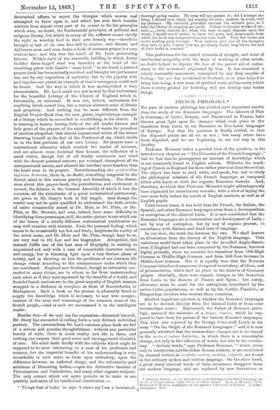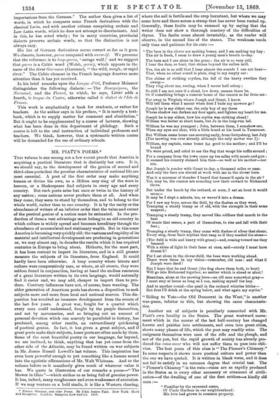FRENCH PHILOLOGY.*
Palmstra Gallica; or, an Introduction to the Philology of the French Language, for the Use of Colleges and the Upper Forms of Public Schools. By A. L. Meissner, Ph.D. Professor of Modern Languages in the Queen's University in Ireland. Leaden ; Longuians. 1868.
No part of modern philology has yielded more important results than the study of the Romance languages. The labours of Diet in Germany, of Littre, Burguy, and Raynouard in France, have thrown great light upon the changes which took place in the transition from Latin to the Romance or Neo-Latin languages of Europe. Not that the question is finally settled, or that the disputed points are all set at rest ; but many errors have been dispelled, and we are beginning to see our way in this inquiry.
Professor Meissner takes a general view of the question, in his introductory chapter on "The Elements of the French Language ;" but we fear that he presupposes an amount of knowledge which is not commonly found in English schools. Hitherto, the teach- ing of French in England has been rather practical than theoretical. The object has been to read, write, and speak, but not to study the philological relations of the French language, as compared either with Latin or with the cognate Romance dialects. And, therefore, we think that Professor Meissner might advantageously have expanded his introductory remarks, with a view of laying the case more fully before the minds of English teachers, as well as of English pupils.
Until recent times, it was held that the French, the Italian, the Spanish, and other Romance languages arose from a decomposition.. or corruption of the classical Latin. It is now considered that the - Romance languages are a continuation and development of Latin ; not by way of corruption, but by way of organic process, in accordance with distinct and fixed laws of language.
In our view, the truth lies between the two. We shall borrow
an illustration from the history of the English language. That variations would have taken place in the so-called Anglo-Saxon, even if England had not been conquered by the Normans, becomes highly probable, when we consider the transition from Old-High German to Middle-High German, and from Old-Low German to Middle-Low German. But it is equally true that the Norman Conquest introduced numerous changes of vocabulary, of idiom, and of pronunciation, which find no place in the dialects of Germany proper. Similarly, there were organic changes in the transition from Latin to the dialects of France and Spain ; but surely,. allowance must be made for the corruptions introduced by the native Celtic populations, OS well as by the Gothic, Frankish, or Burgundian invaders who overran those countries.
Another important question is whether the Romance languages
are to be derived directly from the classical Latin or from some intermediate source. Raynouard, the father of Romance philo- logy, assumed the existence of a langue romane, which he sup- posed to have been the parent of the various Romance languages. This view was rejected by Sir George Cornewall Lewis in his essay " On the Origin of the Romance Languages ;" and it is now generally admitted that the intermediate changes are to be traced in the media et ityinia Latinitas, in which there is a remarkable change, not only in the inflection of words, but also in the vocabu- lary. "Archaic words," says Professor Meissner, " which occur only in inscriptions and the oldest Roman authors, or are mentioned by classical writers as vocabula rustica, sordida, vulgaria, are found in the ordinary spoken and written language. On the other hand, a great many classical words of daily occurrence disappear from the modern language, and are replaced by new derivatives or importations from the German." The author then gives a list of words, in which he compares some French derivatives with the classical Latin, and with another column comprising archaic and Low Latin words, which he does not attempt to discriminate. And in this, he has acted wisely; for in many countries, provincial dialects preserve archaic words, so that the distinction is not always easy.
His list of German derivatives seems correct as far as it goes. We observe, however, garou compared with werwolf. We presume that the reference is to loup-garou, 'savage wolf ;' and we suggest that garou is a Celtic word (Welsh, garw), which appears in the name of the river Garumna (Garonne), "the wild, rough, or rapid river." The Celtic element in the French language deserves more attention than it has yet received.
In his brief remarks upon the Langue Professor Meissner distinguishes the following dialects : — The Bourguignon, the Normand, and the Picard, to which, he says, Littre adds a fourth, la langue du Centre, otherwise called le dialect de de France.
This work is emphatically a book for students, or rather for teachers. As the author says in his preface, "it is merely a text- book, which is to supply matter for comment and elucidation." But it ought to be supplemented by a course of lectures, showing what has been done in this department of philology. Such a course is left to the oral instruction of individual professors and teachers. We think, however, that a systematic written course will be demanded for the use of ordinary schools.



































 Previous page
Previous page